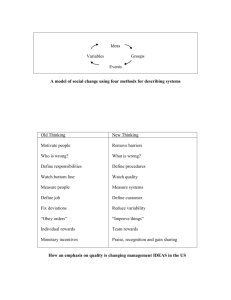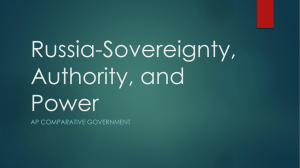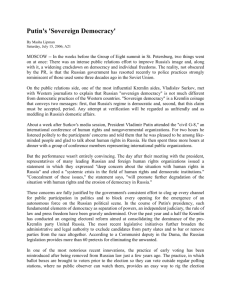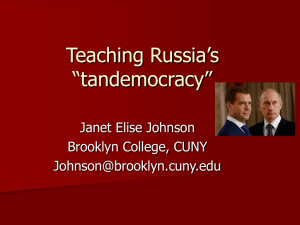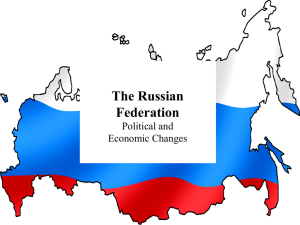Russian Political Weekly - Personal homepage directory
advertisement
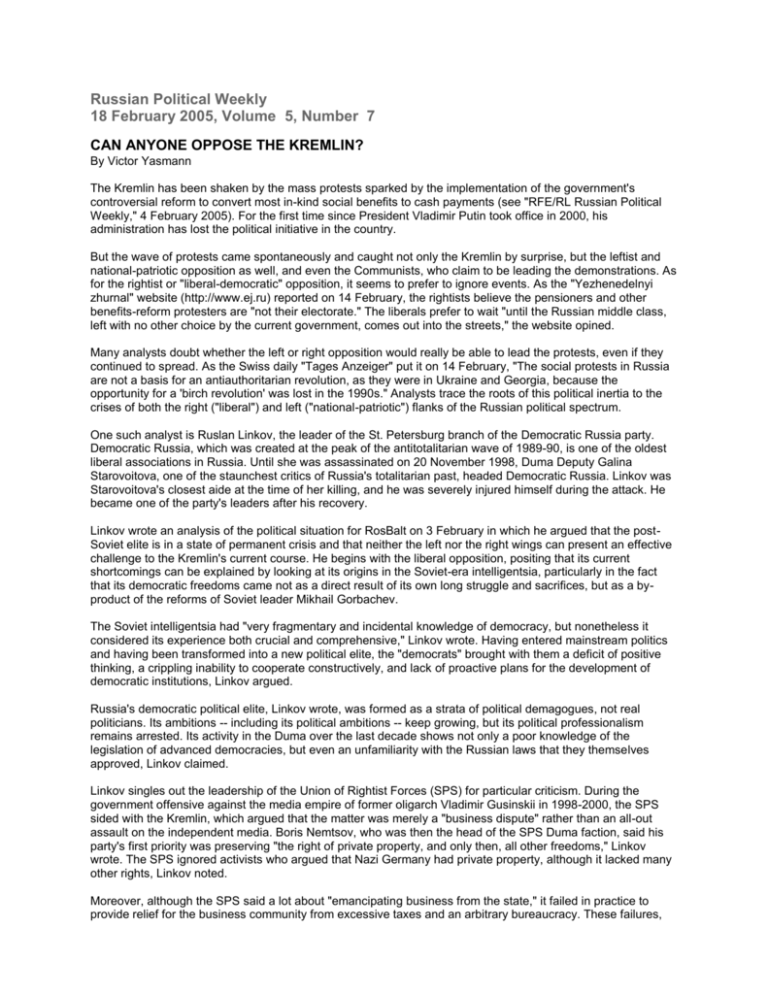
Russian Political Weekly 18 February 2005, Volume 5, Number 7 CAN ANYONE OPPOSE THE KREMLIN? By Victor Yasmann The Kremlin has been shaken by the mass protests sparked by the implementation of the government's controversial reform to convert most in-kind social benefits to cash payments (see "RFE/RL Russian Political Weekly," 4 February 2005). For the first time since President Vladimir Putin took office in 2000, his administration has lost the political initiative in the country. But the wave of protests came spontaneously and caught not only the Kremlin by surprise, but the leftist and national-patriotic opposition as well, and even the Communists, who claim to be leading the demonstrations. As for the rightist or "liberal-democratic" opposition, it seems to prefer to ignore events. As the "Yezhenedelnyi zhurnal" website (http://www.ej.ru) reported on 14 February, the rightists believe the pensioners and other benefits-reform protesters are "not their electorate." The liberals prefer to wait "until the Russian middle class, left with no other choice by the current government, comes out into the streets," the website opined. Many analysts doubt whether the left or right opposition would really be able to lead the protests, even if they continued to spread. As the Swiss daily "Tages Anzeiger" put it on 14 February, "The social protests in Russia are not a basis for an antiauthoritarian revolution, as they were in Ukraine and Georgia, because the opportunity for a 'birch revolution' was lost in the 1990s." Analysts trace the roots of this political inertia to the crises of both the right ("liberal") and left ("national-patriotic") flanks of the Russian political spectrum. One such analyst is Ruslan Linkov, the leader of the St. Petersburg branch of the Democratic Russia party. Democratic Russia, which was created at the peak of the antitotalitarian wave of 1989-90, is one of the oldest liberal associations in Russia. Until she was assassinated on 20 November 1998, Duma Deputy Galina Starovoitova, one of the staunchest critics of Russia's totalitarian past, headed Democratic Russia. Linkov was Starovoitova's closest aide at the time of her killing, and he was severely injured himself during the attack. He became one of the party's leaders after his recovery. Linkov wrote an analysis of the political situation for RosBalt on 3 February in which he argued that the postSoviet elite is in a state of permanent crisis and that neither the left nor the right wings can present an effective challenge to the Kremlin's current course. He begins with the liberal opposition, positing that its current shortcomings can be explained by looking at its origins in the Soviet-era intelligentsia, particularly in the fact that its democratic freedoms came not as a direct result of its own long struggle and sacrifices, but as a byproduct of the reforms of Soviet leader Mikhail Gorbachev. The Soviet intelligentsia had "very fragmentary and incidental knowledge of democracy, but nonetheless it considered its experience both crucial and comprehensive," Linkov wrote. Having entered mainstream politics and having been transformed into a new political elite, the "democrats" brought with them a deficit of positive thinking, a crippling inability to cooperate constructively, and lack of proactive plans for the development of democratic institutions, Linkov argued. Russia's democratic political elite, Linkov wrote, was formed as a strata of political demagogues, not real politicians. Its ambitions -- including its political ambitions -- keep growing, but its political professionalism remains arrested. Its activity in the Duma over the last decade shows not only a poor knowledge of the legislation of advanced democracies, but even an unfamiliarity with the Russian laws that they themselves approved, Linkov claimed. Linkov singles out the leadership of the Union of Rightist Forces (SPS) for particular criticism. During the government offensive against the media empire of former oligarch Vladimir Gusinskii in 1998-2000, the SPS sided with the Kremlin, which argued that the matter was merely a "business dispute" rather than an all-out assault on the independent media. Boris Nemtsov, who was then the head of the SPS Duma faction, said his party's first priority was preserving "the right of private property, and only then, all other freedoms," Linkov wrote. The SPS ignored activists who argued that Nazi Germany had private property, although it lacked many other rights, Linkov noted. Moreover, although the SPS said a lot about "emancipating business from the state," it failed in practice to provide relief for the business community from excessive taxes and an arbitrary bureaucracy. These failures, Linkov wrote, contributed to the "institutionalization of corruption" in Russia. The rightists, he notes, initiated and pushed through the bankruptcy legislation that, together with tax legislation, is the main lever being used in the case against oil giant Yukos. The democratic elite failed to create a foundation for the democratic development of Russia when it had the chance, Linkov wrote. It failed to create a sufficient legislative basis for a stable democracy. Linkov also recalled that the idea of political-party reform was born within the SPS, including the idea of raising the barrier for entry into the Duma from 5 percent of the popular vote to 7 percent. The "elitists" within the SPS hoped by this to eliminate their smaller competitors on the liberal flank, but the Kremlin is now successfully using this tool against the SPS and Yabloko, who are now protesting against it. In addition, Linkov wrote, although until as recently as the last year or so the liberals had key posts in the government, the Duma, and the presidential administration, they made no serious efforts to find a peaceful solution to the conflict in Chechnya. They did not resist the expansion of the so-called siloviki -- members of the state-security community -- into public institutions of power. The liberals even helped Putin build up the "vertical of power," which was then used to crush the horizontal network of civil society, Linkov argued. He noted that the SPS and Yabloko supported the Kremlin-inspired installation of Valentina Matvienko as governor of St. Petersburg. In this context, their protests now against the elimination of the direct election of regional executive-branch heads seem pretty meaningless, Linkov wrote. Finally, Linkov said most of the democratic elite ignored human rights as a legitimate arena of political activity, and it is no coincidence that Soviet-era political prisoners and activists such as Sergei Kovalev have preferred to keep their distance. In conclusion, Linkov argued that the democratic elite has practically died, although it continues to resist its final demise. This resistance, he wrote, is barring the way into politics for a younger and genuinely democratic generation. Moreover, the democratic elite is playing into the hands of the "national-patriotic opposition," which never tires of contrasting the personal wealth of the democrats with the widespread poverty throughout Russia. As a result, the very notion of democracy has become debased. Turning his attention to the leftist opposition, Linkov argued that it is guided by two conflicting ideological aims - "Russia for the Russians" and "Russia as an empire." According to polls, about 60 percent of Russians support statements such as, "The Russian nation is one of the world's great nations," and, "Russian Orthodoxy is the greatest Christian confession." About 200 public organizations openly use slogans such as these, Linkov wrote, even though they contradict the idea of imperialist expansion. "Throughout Russian history, patriots have called both for the defense of Russia's borders and for their 'expansion,' while also accusing those peoples who have been colonized against their will of causing harm to the Russians," Linkov wrote. In addition to defending the greatness of Russia, these patriots also fight against Russia's "numerous" enemies, including the United States, people from the Caucasus, "Judeo-Masons," and many others. The patriots are convinced that the West has taken up arms against Russia and against them personally, Linkov wrote. The authorities have co-opted many slogans of the national-patriots "because they provide the bureaucracy with a cover of unaccountability" and they allow the Kremlin to push Russia "along its unique historical path" without taking into consideration the democratic norms accepted throughout the developed world, Linkov argued. At the same time, neither patriotic and statist beliefs nor communist convictions prevent these elites (including the hierarchy of the Russian Orthodox Church) from buying upscale Western gadgetry, luxury cars, and other goods. Patriotism does not prevent many of them from stealing state funds, accepting bribes, or living in extravagant, Western-style mansions. "Our best 'patriots' today are corrupt politicians and officials, the siloviki who are making money through their links with criminals and from the criminals themselves," Linkov charged. These are the same people who keep calling on ordinary Russians to be patient and endure and "to keep believing in Russia's unique path," Linkov wrote. The bottom line of Linkov's analysis is that only the emergence of fresh political forces can halt the increasingly authoritarian tendencies of the current regime in Russia. DEBUNKING THE CASE AGAINST PUTIN'S AUTHORITARIANISM By Gordon Hahn Russia watchers have become engaged in a contentious debate over whether President Vladimir Putin's form of rule constitutes a qualitative break from the nature of the regime extant under his predecessor, President Boris Yeltsin. Some argue that Putin's regime is not fundamentally different and that both his and his predecessor's rule were authoritarian. Others argue that Putin has halted and reversed the democratization process and dismantled nascent democratic institutions to such an extent that a transition of sorts has occurred from a weak, perhaps "managed" democracy to a regime that is essentially authoritarian. Ironically, those who espouse the former view include some who earlier claimed that Yeltsin's rule was undemocratic. Those who support the latter view never qualify their charge against Putin's authoritarianism, and sometimes use such terms as "dictatorship," "autocratic," and "police state" to characterize Putinism. In fact, the truth lies somewhere between these two views but closer to the latter: Putin's system is neither democratic nor staunchly authoritarian. Just as Yeltsin's democracy was properly framed by considerably qualifying terms such as "weak," "limited," "illiberal," or "managed," Putin's new order should be qualified as a soft, pluralist authoritarianism. At least four major points made by those who refute Putin's authoritarianism need to be debunked. I. Restricting independent media. The argument against the view that Putin has eviscerated free media in Russia usually consists of three points: (1) there is an abundance of print media free, willing, and able to criticize the president and his policies; (2) there is still criticism of Putin on television; and (3) under Yeltsin the media were not free, as they were dominated by the oligarchs. On the first point: It is true that there is an abundance of print media, but the overwhelming majority of publications are completely devoid of political content. Political publications have extraordinarily low print runs and even lower real circulations. Thus, most Russians, like most people in most modern societies, obtain their news primarily from television, the true "mass" media. Second, criticism of Putin on Russian television is rare and, as such, it is usually noteworthy. Criticism of Putin's opponents, on the other hand, is pervasive and routine. The elimination of talk shows with high-profile and charismatic hosts is part of an effort to cleanse the political space of any opinion and of political leaders independent of the Kremlin who might rally a challenge to the ruling elite. Scattered talk remains, but potential action is preempted, providing limited pluralism of opinion and only the appearance of freedom and democracy. Third, the charge that Yeltsin quashed free media is simply false, and, moreover, if true would still not refute the authoritarian nature of Putin's limitations on free mass media. In fact, the oligarchs were not a united force and owned competing channels with opposing views that, in turn, differed from those of state-controlled television. The pluralism of television ownership guaranteed a pluralism of views, however manipulated and at times co-opted by Yeltsin. Under Putin, the much smaller space for alternative views and criticism of the authorities does not approach the level of democracy, but suffices merely to offer the illusion of press freedom. II. Repressing opposition parties. The case against this point is that the opposition itself, communist and democratic alike, is to blame for their recent electoral failures. Debunking this point in part requires going back to the first. The authorities' hegemony (not monopoly) over the media enables it to discredit the opposition, while the opposition is afforded little opportunity either to advertise its views or challenge those of the Kremlin. More importantly, there is the regime's use of administrative resources -- financial and infrastructural resources, the tax police and other forms of police pressure, the election commissions, and the courts -- to disadvantage or remove opposition candidates from the field. Here, the limited nature of Putin's authoritarianism is evident in the absence of a ban or crackdown on political parties. The barrier for admission to the Duma has simply been raised to 7 percent, and opposition parties' vote tallies are tamped down through administrative resources, dirty political technologies, and the limited falsification of results. Although many of these tactics were seen under Yeltsin, they were not practiced on such a grand scale. III. De-federalization. The case is usually made against this by focusing on one aspect of Putin's federative counterreforms, rather than looking at them together and assessing their cumulative effect on federalism and democracy. These include: the creation of the extra- or unconstitutional federal districts and their coordination of the application of administrative resources; the emasculation of the Federation Council by having senators appointed by governors and regional legislatures under the pressure of the Kremlin's wielding of administrative resources and kompromat; the abandonment of federal-regional, power-sharing treaties; the re-centralization of lawmaking by requiring regional laws to comply with federal law; and, most recently, the presidential appointment of regional governors with the limited check of the regional legislatures' power to confirm the president's nominee. This last move means that now Putin will have strong indirect influence on the Federation Council, which as the federal parliament's upper house is supposed to perform the function of balancing the executive branch's power. Taken together, these changes amount to the dismantling of most of Yeltsin's nascent federative system and a considerable backsliding in Russia's democratization process. Again, the limits of Putin's soft authoritarianism are reflected in the regional parliaments' role in appointing half of the Federation Council's senators and confirming the president's gubernatorial nominees. It should be acknowledged that this is a significant restraint on presidential power. Certainly, no Russian tsar and no CPSU general secretary would have countenanced such an inconvenience and potential obstacle to his or her arbitrary exercise of power. However, this limitation hardly warrants the nomenclature "democracy." IV. Creating an autocratic presidency. The case against this criticism of Putinism is that under Yeltsin there was a super-presidential system and that many of today's critics of Putin's hegemonic presidentialism remained silent then. Countering this point again requires going back to prior points. The de-democratization of Russian elections and the suppression of opposition parties have secured a compliant Duma majority of the pro-Kremlin Unified Russia party, which takes its marching orders from the presidential administration. Not even the party's own leaders determine the party's positions. Putin, presidential-administration head Dmitrii Medvedev, and deputy presidential-administration head Vladislav Surkov do. Under Yeltsin, the Duma was dominated by an oppositionist Communist Party and was able to block numerous (albeit, often desirable) legislative initiatives. V. The siloviki. One charge that Putinism's defenders rarely try to refute is that the notorious siloviki function without any civilian control except for the president. There has been little civilian control, and with the subordination of the legislature to the president, there can be none. The lack of parliamentary oversight explains in part the ability of the law-enforcement organs to run roughshod over the rights of average citizens and, especially, the citizens of Chechnya. The scope of law enforcement's arbitrariness is writ large in the case of the police marauding in Blagoveshchensk on 10-14 December, an incident in which as many as 1,000 people were allegedly detained, assaulted, and even raped by police. The subordination of the Federation Council has secured the compliance of the upper house, completing the submission of the federal parliament to the presidential executive. The restrained character of Putin's authoritarianism is shown here in the existence of legislative bodies that discuss, debate, and often make minor amendments to legislative bills submitted by the executive. In sum, the claim that Putin's system is democratic is weak and does not hold water. That said, we should be careful not to exaggerate, as many do, the depth and aggressiveness of Putin's authoritarian system. It is still a hybrid regime to a considerable extent. Similarly, persisting in the characterization of Putin's order as managed or some other form of democracy lets him off the hook for dismantling much of Russia's democratic infrastructure and may encourage him to go further down that road. A precise calibration and characterization of Putin's regime could facilitate, in tandem with a well-measured mix of policy carrots and sticks, turning him or his successor back toward democracy. Gordon Hahn is a visiting scholar at the Kennan Institute for Advanced Russian Studies.

